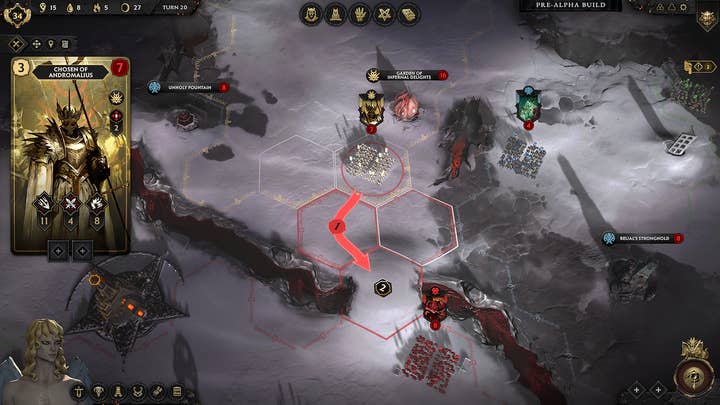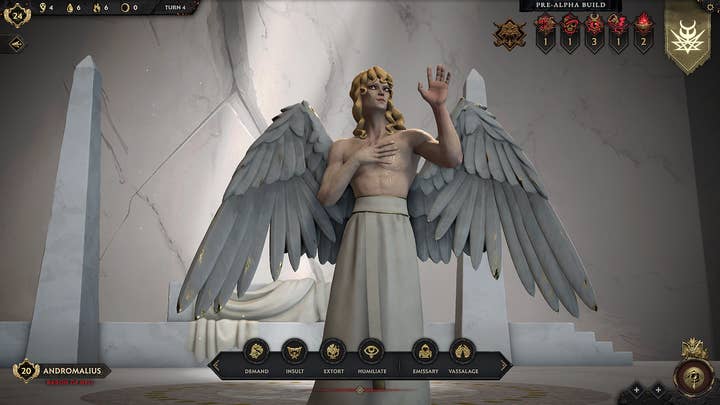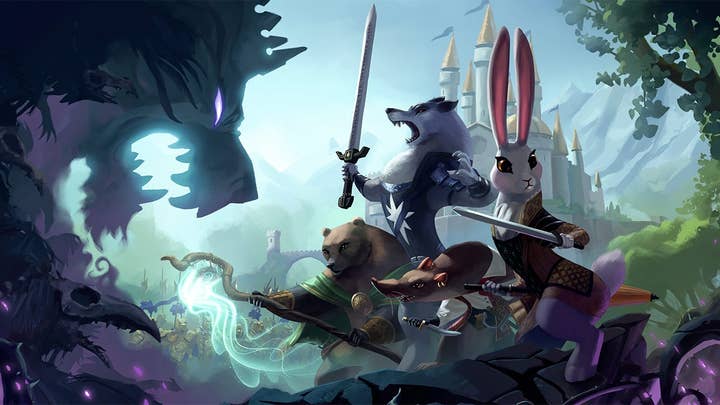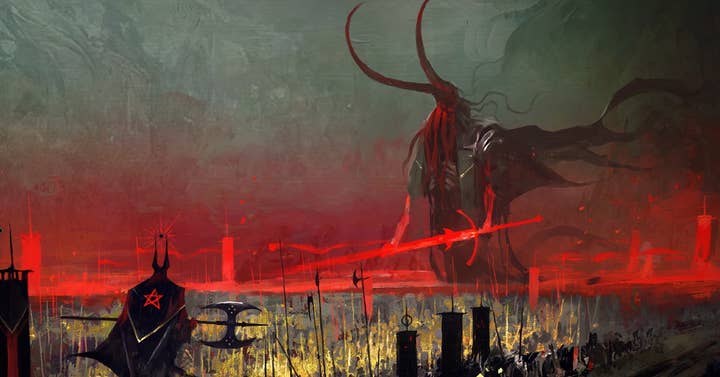Life after Armello: How League of Geeks wants to "nip at the revenue of the big guys"
Co-founder Trent Kusters on remaking cult classic Solium Infernum, the challenges met along the way, and the thriving Australian industry
It's been 11 years since the creation of League of Geeks and the Australian studio starting development on its debut title, the very successful Armello.
And seven years after Armello's Early Access launch, League of Geeks is finally ready to unveil a second title. At EGX today, the studio announced that it's working on a remake of Vic Davis' 2009 cult classic, Solium Infernum, with a planned launch for 2023.
"The greatest trick the devil ever pulled is running a studio for 12 years off the back of one game," League of Geeks co-founder Trent Kusters says with a laugh when we meet at Gamescom. "The roadmap for content and features has ended on Armello. I think we did over 27 major updates, and a bunch of patches, five or six DLC, and everything in between that."
"The greatest trick the devil ever pulled is running a studio for 12 years off the back of one game"
Armello's latest big update was only a couple of months ago, adding cross-play to the title. Kusters' love for Armello is palpable, but it's also clear that he's excited about moving on and finally being able to talk about Solium Infernum and what's ahead.
"[Solium Infernum] was a huge inspiration for Armello," he says, hinting at similarities between the two games in their digital board game aesthetics and elements. "So it's a real honour. We've known Vic [Davis] for years. And when we were [thinking] 'What are we gonna do for our next game', Ty Carey – my co-founder – was just like, 'let's do this, let's talk to him.’
"So we had a chat and we acquired the IP, and he passed on the torch to us and everyone's really happy and we're super excited!"

Solium Infernum is one of two titles currently in development at League of Geeks (the other one will be unveiled later down the line) and the studio seems to have found the right balance for its staff and projects, after some setbacks.
"We're about 55/56 people around," Kusters says. "We have teams of 25, approximately, on both games. Both games kicked off at the same time, they have identical budgets, the same amount of resources and talent on them, and [for] the structure of the teams, we have a game director and an executive producer, and then we have a number of principals for each of the disciplines," he explains.
"We're very lucky in the sense – and we worked hard for it – that the studio does have a really great culture of being a studio. And we've actually failed at it before. We were working on a bigger game at one point with Private Division, and when we spun up we still had Armello in development, and we were a two-team studio then. And we absolutely got it wrong. We had the A team/B team thing, but it was quite tough. We had another go at it this time around and we're super proud of [it], it's like both teams are just rooting for each other massively."
"We signed the [Private Division] deal pre-COVID, COVID happened... and we're ambitious, but we're not crazy"
League of Geeks initially signed a publishing deal with Private Division back in 2020, and even though it didn't come to fruition, Kusters is grateful about what the studio learnt along the way.
"It's nothing really exciting to be honest," Kusters says when asked about what happened with Private Division. "Basically we signed the deal pre-COVID, COVID happened and we were in deep production, scaling on a big game, they were scaling as a publisher, and we're ambitious, but we're not crazy.
"It was just very, very tough going. And we were like: you know what, let's de-risk, let's do something else. And we went separate ways very amicably."
Instead, League of Geeks has the support of games fund Kowloon Nights, which aligns better with its business model, Kusters says.
"Another reason [for dropping out of the Private Division deal] was that we just love self-publishing. And so we wanted to get back to the self-publishing side of things too. We learnt so much working with them, but it felt like someone else had our ball, you know? Other than just it being hard with COVID, we were like: 'Sigh, we want to do the trailers' and so on.
"Both of these projects are co-financed with Kowloon Nights and they're a fantastic partner. We funded a percentage of the game, they funded a percentage of the game, and they just hang out in the background and, if we need anything, they can slide up and down the lever on how much support they give. They're a games fund and not a publisher, so for studios like us who are totally capable of – and actually want to dive into – publishing, it's a dream."

For its upcoming projects, including Solium Infernum, League of Geeks wants to use the same recipe that made Armello such a success: long-term support, and really taking the time to flesh out what the team is building over time. Even though that came with its own set of challenges for Armello.
"Every game at League of Geeks we basically set up to be games-as-a-service," Kusters says. "Outside of the creative side of things, we care a lot about sound financial governance. To be honest, we worked for too long on Armello. And of course, it's great for the community and now we've got cross play and everything…
"But for example, that last cross-play patch through COVID, and working on the bigger game with Private Division, and the difficulties with having two teams that I told you about, and then Microsoft acquiring Playfab [that LoG was using to develop the multiplayer] during it, and stuff changing on the multiplayer... We spent so much money – hundreds of thousands of dollars – just trying to get out this one update. We do it for the community. But if we were running a sort of ROI, absolutely there is a point for the most premium game-as-a-service – unless you're World of Warcraft – where you say: okay, that's enough. Because then you can actually move on to a new IP or a new game and start a whole cycle again. We're building IP, we're building brands, we're building characters and stories."
"We want to create a stable IP that has cross-media potential... If Armello is our Warcraft, Solium Infernum is our Diablo"
Kusters says that, before Blizzard became known for its toxic workplace issues, League of Geeks aspired to follow in its footsteps.
"Not so much that we want to be 10,000 people, but we want to create a stable IP that has cross-media potential. I remember in the early days of Armello saying, 'I don't think it's gonna be this successful but we can't do anything that's going to stop Armello from being a Harry Potter'. It's got to be able to be that.
"And so all our brands are built in that way, both with Solium Infernum and the next game as well that we're working on. And so if Armello is our Warcraft, Solium Infernum is our Diablo, and then we got our Starcraft. We're focusing on building these brands and IPs and rotating great games through them. And so I imagine Armello 2 is probably not going to be another digital cardboard game. We might do an RTS or an RPG or something, I don't know."
Armello's success story – Kusters says it opened up opportunities for League of Geeks that the studio is "still taking to the bank today" – is one of many Australian success stories of recent years. And the Digital Games Tax Offset introduced last year in the country is only going to reinforce the industry's momentum, Kusters says.
"[Someone from] VicScreen, the funding body, was telling me that if [the state of Victoria] was a publisher we'd have one of the best slates in the world. The Forgotten City, Cult of the Lamb, Armello, Untitled Goose Game... And that's just one state in Australia.
"There's a lot of things happening in Australia with games. We've got the DGTO, the game tax that's almost exactly the same as Montreal. But I think, unlike Montreal, it's coming at a really interesting time for us because we're not building an industry from scratch with that offset, we have a full ecosystem. We've got everyone from your four-person Untitled Goose Game studio, to Sledgehammer making Call of Duty.
"So we have the full spectrum ecosystem, and then the folks in between like us, creating original IP. So it's gonna be really interesting to see what that offset does. I mean, we're eligible for that tax offset. For us it's huge – 30 cents back on the dollar spent in Australia? That's a game changer for us. It means that we can roll the dice. That's invaluable."

Kusters points to Australia's 30-year history of fantastic games, and how a lot of that talent was "brain-drained" overseas in the early 2000s.
"[They] ended up creative directors or tech directors at Ubisoft and different places. But now there's a really great ecosystem in Australia. And I mean, I had grand plans of moving overseas and being all those things – but we just stayed and built a studio in Australia. I've created this home for talent because the opportunities are fantastic. It's a fantastic place to live. The only thing is the two planes and the train to get here and chat to you!"
League of Geeks' 11 years of existence is a testament to Australia's strong ecosystem as well. The studio now defines itself as "triple-I" and, concluding our chat, we ask Kusters what it means for him and the team.
"[The DGTO] is a game changer for us. It means that we can roll the dice. That's invaluable"
"Triple-I to us as a studio essentially means that we want to be at the very top in terms of production values – the top tier of what you see in indie games, to the point where some players don't even know that we're in an indie title. We can compete with a Humankind or a Civilization in regards to production values to a large degree.
"But we don't do it with a team of 100 like a Creative Assembly might have, we do it with a team of 25 or 30, and so that feeds into the type of games that we make. They can't be content driven, they have to be systemic. And it also means we've got to be resourceful in how we go about not just running our business, but how we actually make decisions on the fly. We have less redundancy on our team than other places, we've got to make smarter decisions and that, I think, keeps us hungry.
"I think for us too – and this isn't necessarily for everyone – it also speaks to the publishing side of things that we have in-house. We have this full 360 degrees sort of boutique publishing capability.
"So that's really what triple-I mean. We want to be able to nip at the revenue of the big guys."









